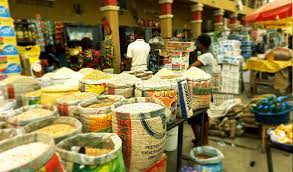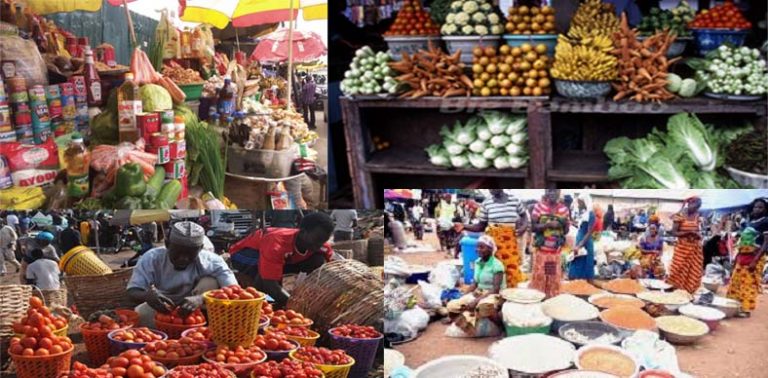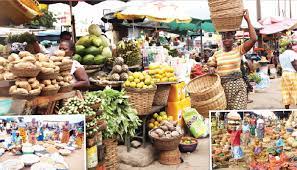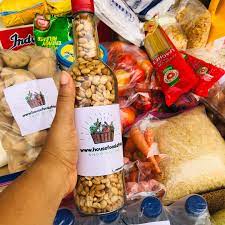PAG Felicitates Muslims on Commencement of Ramadan Fast
February 18, 2026TOP TEN MUSLIM UNIVERSITIES IN AFRICA
February 14, 2026ANALYSIS: Why Nigeria GDP is not the best in Africa Despite having the largest market
February 10, 2026SPECIAL REPORT: Rising Food Prices Mount Pressure On Nigerians Amidst Poor Purchasing Power
SPECIAL REPORT: Rising Food Prices Mount Pressure On Nigerians Amidst Poor Purchasing Power

By Sanusi Abdullahi Oyelekan.
Nigeria recorded an average of about 30 per cent increase in the prices of major food items consumed in many households in the country in the recent times, SANUSI ABDULLAHI OYELEKAN engages some citizens about the market reality of commodities.
Following the recent rebound of the naira against the dollar, the price of a 50 kilogramme bag of rice has dropped to an average of N67,000 in Lagos, Abuja, Ogun, and others, from about N90,000 in February 2024.
A market check conducted on food prices by our correspondent across eight states in the country shows that the prices of food items have been on a steady rise in the last 12 months.
The food items monitored include yam, rice, beans, vegetable oil, palm oil, tomatoes, pepper, maize, onion, and millet.
Residents in the parts of Nigeria have called on Federal Government to come to their aid as prices of essential food items went up by at least 30 per cent between December and April as earlier reported by this medium.
The situation has made consumers in states like Lagos, Ogun, Gombe, Kwara, Sokoto, Ekiti, Osun and Niger states lamented the hardships caused by the price hikes.
Speaking to the newsmen, a resident of Isolo, Mr Rafiu Adedoja, complained that the price of a wrap of his favourite meal, amala, had increased.
According to him, due to the nature of his work as a bricklayer, he eats daily at a popular canteen. He lamented that he used to buy a wrap of amala for N100 but now he buys at N200, noting that the portion has become smaller.
He noted that he now buys at least five wraps which is N1,000, excluding the meat which brings the cost of his meal to between N1,600 and N2,000 which is not economical for him given the present state of the economy where jobs come in trickles.
Also speaking to our correspondent, a mother of four, who is a hairdresser in the Okota area of Lagos, Mrs Bola Adekunle, decried that the majority of the food items in the market especially garri, beans, groundnut oil, and even yam had increased which was affecting so many people especially low-income earners like her with children to feed.
She told our correspondent that food prices were becoming unbearable and getting worse daily.

“We eat once a day now, but if I record higher sales, we can eat twice. In the last two months, I can’t remember the last time that my family ate three square meals,” Adekunle moaned.
An industrial chemist, Mr. Harrison Chinaka, said, “It is very obvious that there has been a continuous and rapid hike in the prices of goods in the market. I mean every foodstuff in the market; the prices are increasing almost every hour
“You find out that what you bought in the morning by the time you get there in the afternoon or evening, they will tell you that the price has changed. I bought a paint of garri not up to two weeks ago for about N2, 900 and three days after I went to buy the same quantity of garri and I was told it now goes for N3,500
“The same thing applies to bread and provisions, the prices of everything are increasing and it is not as if salaries are being increased and it is becoming difficult for an average Nigerian to cope especially someone with a family. The person has to pay school fees, house rent and continuously pay bills, it is becoming difficult to survive here in Nigeria,” he said.
Also speaking, Mr. Prosper Dike, said, “As for me what I will say is that the prices of commodities now are no longer the same as it is used to be before. For instance, a bag of rice has gone higher than what it used to be. How do you expect us with our source of income that has not increased, how do we meet up considering the way things are going?”
Pointing out that the price of the dollar had depreciated to the naira in recent times, a factor that lots of traders blame for the hike in food prices, Dike wondered why prices of food are yet to reduce.
The development has made consumers groan, saying the hikes in the prices of goods have affected their budgets.
Prices of food items have continued to soar across the country despite the recent rebound of the naira.
This came as President Bola Tinubu recently vowed to ensure a rebound of the local currency reflected in the prices of commodities.
As a follow-up to the President’s decision, operatives of the Federal Competition and Consumer Protection Commission (FCCPC) last week raided some Abuja supermarkets over unfair pricing, vowing to extend the clampdown to other states.
However, the latest findings by our correspondents showed that the prices of basic food items like beans, and garri had risen by at least 30 per cent.
In the past few months, the prices of major food items have continued to rise, especially after Tinubu removed the petrol subsidy and devalued the naira. As the country’s inflationary pressure deepens, Nigerians have been finding it difficult to put food on their tables. This became aggravated when the naira fell sharply against the dollar and other foreign currencies like the CFA between February and March.
As the naira appreciated in the foreign exchange market lately, there were high expectations that the prices of food items, which went up alongside the dollar, would also follow a downward trend in the market. However, findings by our correspondents confirmed that only the prices of rice had so far reduced.
As of Wednesday, findings showed that the prices of beans, garri and other food items remained high despite the naira appreciation.
Our correspondents who visited various markets in some states gathered that traders and sellers were lamenting over the high cost of food items; though the prices differ depending on the location.

According to the surveys, a bag of garri now sells at N41,000, up from N37,000 in less than two weeks ago. In January, it was around N31,000. This indicates a 31 per cent increase.
Similarly, a bag of one kilogramme of Semovita which went for N700 in December now goes for N1,400. This represents a 100 per cent increase in the price. Also, one kilogramme of wheat which went for N500 in December is now being sold for N1,200. This indicates a 140 per cent hike.
Also, findings showed that in January, a bag of beans went for between N65,000 and N70,000.
However, as of Wednesday, a bag of beans went for N185,000. This indicates a 164 per cent increase.
In communities close to the borders, it was gathered that the staple was selling at a much lower rate compared to what was obtained in the cities.
For example, in Ogun border communities like Imeko, Idiroko, Oja-Odan, and others, a bag of rice was selling for around N49,000 or below.
According to Ms Mayowa Tosho, a bag of rice now sells for N42,000 at Saki, a border community in Oyo State.
Our correspondent gathered that the prices of foreign parboiled rice had dropped more than those of local brands.
INTEGRITY NEWS reports that former President Muhammadu Buhari banned the importation of rice through the land borders in 2015.
The Federal Government, through the Nigeria Customs Service, said rice should only be imported through the seaports after the payment of all necessary duties.
In the same year, the Central Bank of Nigeria prohibited the importers of rice and 41 other items from accessing foreign exchange through the official window, to promote local production.
However, the ban on those items, including rice, was lifted by the apex bank in October. As a result, they can now access forex from the official market.
Since then, the prices of rice have continued to soar above the purchasing power of ordinary Nigerians.
Data from the Selected Food Prices Watch Report of the National Bureau of Statistics analysed by the newsmen showed that the average price of 1kg of local rice rose from N172.74 in February 2016 to N520.84 as of February 2023.
The removal of subsidy on petrol and the floating of the naira in the middle of last year shot up the prices of food items, leading to high inflation.
As the dollar fell against the dollar, rice soared to as high as N90,000 in Lagos between February and March.
However, our correspondents, who visited various markets across Lagos, Abuja, Ogun, and others, confirmed that the food items were on a downward trend.

Selected rice sellers in Agege and Oshodi markets said the price of rice had been reduced to between N65,000 and N63,000 compared to December 2023 and January 2024, when the staple was sold between N75,000 and N80,000.
The traders, who spoke with our correspondent, noted that the long grain rice, which sold between N42,000 and N50,000 mid-last year, jumped to N80,000 in January, causing an outcry among consumers.
In Oshodi, Ogechukwu Amadi noted that she bought a bag of rice between N74,000 and N76,000 in December and sold it for N83,000 during the period.
According to Amadi, she now buys rice for around N60,000 and sells it for N63,000.
“Our purchase rate will always determine our selling price. In most cases, wholesalers usually add about N2,000 to their selling price, and this has caused non-uniformity in the prices traders sell in the market.
“In December, I was buying between N74,000 and N76,000. But I now sell for N65,000 and sometimes N62,000, depending on who sold the stock to me,” she stated.
Another trader in the Agege market, who simply identified himself as Ade, confirmed to our correspondent that the price of the 50kg bag of rice had been reduced to around N60,000.
“We can only thank God that the hardship is not as serious as it was in February. Rice practically turned gold, but we thank God today. I wish it could return to N40,000,” he said.
Similarly, the price of a 50kg bag of rice dropped in different parts of Ogun State.
Our correspondent gathered that the prices differ based on the proximity of the areas to the borders with the Republic of Benin, as communities like Imeko, Ilara, Idiroko, Ipokia, Oja-Odan, and others get the commodity cheaper.
“I bought one bag of rice for N47,000 in Ilara last week. It was close to N70,000 in February and March, even here at the border. But now it is coming down,” a trader, who identified herself as Adeyinka, said on Monday.
Mr Friday Igwe, who sells foodstuffs along Iperu Junction, Ikenne Local Government Area of Ogun State, informed our correspondent that the price of rice had dipped to N65,000, from N88,000 between February and March, while it was N55,000 in December 2023.
He, however, lamented that the prices of beans and garri had continued to increase.
“The price of rice is coming down. As of today, we sell at N65,000 per 50kg bag. Some can even sell at N64,000. It peaked at N88,000 or even N90,000 in February and March, from around N55,000 in December.
“We thank God that it is coming down now. But, the prices of beans and garri are not reducing; instead, they keep rising. The government should do something about it,” Igwe noted.
The Ebonyi State indigene noted that the high cost of food items had affected patronage, saying only a few could afford a small plastic of rice at N2,400 instead of N700 in October last year.
Another trader along Sagamu Road, Adamu confirmed to our correspondent that the price of a bag of rice was now N65,000.00
“The price of rice has dropped. In February, we were selling it for between N80,000 and N85,000; but it has now dropped to N65,000. But the prices of garri and beans did not reduce,” he remarked.
In the Oja-Ale area of Iperu, Success said he could sell one bag of rice at N63,000 if the customer was ready to pay immediately.
“I can’t remember how much we sold a bag of rice for in December. But I know it went up above N80,000 last month. Some even sold for N90,000. Today, it goes for N65,000. I can still sell it for N63,000 if the customer is paying in full,” Success told our correspondent.
It was gathered that a 50kg bag of rice cost N63,500 in Abeokuta, the Ogun State capital, on Monday.
A resident of Oluwo, Abeokuta, Olubokola Odunayo, said she bought a bag of parboiled rice for N65,000 on April 1.
Our correspondent gathered that the reduction in the price of rice has to do with the rebound of the naira against the CFA, the currency acceptable in the French-speaking Benin Republic.
An Islamic scholar, Sulaimon Adewale, told this Medium that a bag of rice was N52,000 in Abeokuta last week before it jumped to over N60,000 when the naira slipped again.
Mr Igwe Christian, a food seller in the Idimu Area of Lagos State, attributed the drop in rice prices to the decrease in transportation costs due to the fall in diesel prices.
Christian maintained that a particular brand of rice that was imported from Thailand, a long grain, was selling for N70,000.00 compared to around N85,000 a month ago.
“The short grain is around N60,000.00 now, and it was around N80,000 before now.
“The reason the prices went up was because of the diesel price. And you know it is an imported goods, so the more the exchange rate for cargo clearance drops, the more the rate drops, the lower the duties paid on these goods, thereby making the commodities cheaper,” he opined.
Speaking with INTEGRITY NEWS correspondent, a wholesale food seller in Isolo Market, in the Oshodi/Isolo Local Government Area of Lagos State, who identified himself as Mr Idris, mentioned that the price of a bag of rice had dropped from N80,000 in March to N66,000.
He noted that the price dropped because the naira was strengthening against the dollar.
Idris added that smugglers also buy rice with the CFA, which also rose so high against the naira in February, saying that affected the price of smuggled grains.
“Rice is being smuggled from Cotonou through the Seme border, and as the naira value depreciates, it is affecting the importation of rice, including the smuggled product. So, now that the naira has gained value, the exchange rate from the Nigerian currency to CFA is higher to purchase rice.
“The major reason it was very expensive was because of the cost of transportation and the bribes that rice smugglers need to pay some of the security agencies at these borders and bushes where they pass through,” Idris said.
At the Wuse market in the Federal Capital Territory, Abuja, the price of a bag of ‘Pretty Lady’ brand of rice dipped to N65,000 from N70,000, while Big Bull dropped to N68,000 from N80,000 a few weeks ago.
The prices were uniform across many vendors in the market.
Experts attributed the recent price adjustments to several factors, including changes in exchange rates, supply dynamics, and government policies.
However, the recent appreciation of the naira against other currencies has likely played a role in making imported goods more affordable.
While consumers welcomed the relief, economists remained cautious, emphasising the need for sustained stability in the rice market.
At the Dutse Market in the Bwari Area Council of Abuja, a 50kg bag of Optimum rice sold for between N68,000 and N71,000, with half of the bag priced between N34,000 and N36,000, while a bag of Mama Gold rice costs N82,000, compared to the previous prices of N76,000 in December.
According to a trader, Mr Obiem, a bag of 50kg Optimum rice was sold for N42,000 last October.
“I bought this same bag of rice last October at N42,000 when I had a major family event. Now, I have to buy half of that same bag of rice for nearly the same price. If it is coming down, I can’t tell because I was charged N68,000 for a full bag,” he said.
Meanwhile, a 50kg bag of Royal Stallion rice, which previously sold for about N77,000 as of March 2024, now sells for between N80,000 and N85,000 at the Wuse International Market, while a 25kg bag sold for about N42,000.
Another customer, Mrs Angela, said she hoped that the efforts of the Federal Competition and Consumer Protection Commission to regulate prices would extend to the market.
“It is unbelievable that there is market management that does nothing to control prices. Rice has become so expensive. N80,000 for a bag? The excuse was the dollar, then. What is the excuse now?” she asked.
END.








